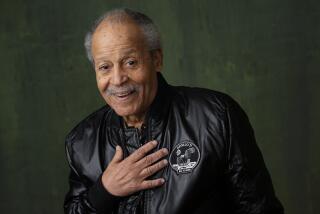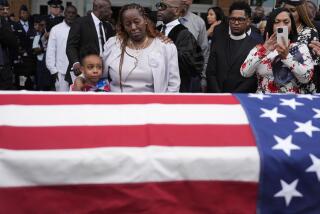In death, two Tuskegee Airmen, lifelong friends, share final journey
Clarence Huntley Jr. and Joseph Shambrey were old friends, children of Los Angeles who made history when they joined the Tuskegee Airmen. Like many who enlisted in the military during World War II, they signed up out of a fervent desire to serve their country. As black men, they did so even as they faced discrimination and segregation back home.
Both were stationed in Italy in 1944 after enlisting in the United States’ trailblazing group of black pilots and service personnel in 1942. The two also came home together, ready to build their lives and start families. Over the decades, Shambrey hosted barbecues every year and invited members of the decorated squadron who lived in Los Angeles. As they got older, Huntley called Shambrey once a month to check on him.
“The black community in L.A. was small at that time. The city was segregated; everyone in the black community knew everybody,” Huntley’s nephew, Craig Huntly told The Times.”He and Joe were friends well before the service.”
They fostered that bond their entire lives, which for both ended Jan. 5. They were 91.
“I wish I would have known who went first, but whoever went first they came and got the other one and said ‘It’s time for us to go together,’ ” Huntley’s daughter, Shelia McGee, said. “That friendship never stopped.”
On Thursday afternoon, Huntley will be laid to rest at Inglewood Park Cemetery. His friend Shambrey was buried Monday at Angelus Rosedale Cemetery.
After taking a train from California to Alabama, the men became part of the “Tuskegee Experience,” an experiment very much of its time that experts say was meant to test black soldiers’ capabilities. The Army Air Forces program in Tuskegee was established “to see if blacks could fly airplanes,” said Ron Brewington, president of the Los Angeles chapter of Tuskegee Airmen Inc., a group devoted to the soldiers’ history.
“There was a lot of segregation going on in this country at that time, and a lot of doubt that these men could fly and that they could engage in combat,” Brewington said. “But they proved them wrong all the way.”
Brewington estimates that a little more than 200 veteran Tuskegee Airmen are known to be alive, though the exact number is unclear. Of the 108 members of the Los Angeles chapter of Tuskegee Airmen, only 20 are veteran Tuskegee Airmen. One former Tuskegee Airman is 105 years old, though he is not part of the organization, Brewington said.
Huntley and Shambrey worked on the planes, though they were not pilots. Many different kinds of workers were part of the storied Tuskegee Airmen, which included support staff as well as fighter pilots.
“It’s kind of like a football team: people only see and hear and talk about the quarterback, but the quarterback stands on the shoulders of the other people on his team,” Huntly said.
As crew chief, Huntley was responsible for making sure the plane of the squadron commander, Capt. Andrew D. Turner, was ready to fly.
Huntly said his uncle earned the nickname “Mother” from pilots because by caring for the planes, he was caring for the pilots. Huntley use to say that pilots would ask about their planes: “How’s she singing today, Mother?” Huntley would reply: “She’s singing sweet today, Skipper!”
Like other black soldiers, Shambrey and Huntley fought two battles, Huntly said: one against fascism and the other against racism.
Huntley “talked about how the Italians treated him overseas. They thought black men had tails, like monkeys,” Huntly said. “They later learned that was not true and they actually became good friends.”
Years after his return, Shambrey told his son Tim about how he and other soldiers traveled to segregated Alabama to pick up their discharge papers.
Stepping off the train with a handful of his friends, Shambrey saw a hospitality station where women in nursing uniforms welcomed returning soldiers home with a handshake and a free cup of coffee.
The women did not greet the black soldiers, who had to pay a nickel for their coffee, Tim Shambrey said.
“Being who they were, they didn’t cause any mess or trouble,” he said. “They paid and went and got the discharge papers.”
Huntley would go on to work as a skycap at Burbank and Los Angeles airports. Shambrey worked for the Los Angeles County Department of Parks and Recreation.
Although the importance of the Tuskegee Airmen didn’t cause an about-face in U.S. race relations, Huntly marvels at how much Shambrey and Huntley saw the country change over the decades, living through the civil rights era and beyond.
“They lived long enough to see a black president. Not only a black president, but a black Army chief of staff,” he said.
And the legacy they forged would begin in earnest with their decision to enlist in the Army of a country that, at the time and for many years after, saw them as lesser men.
“To be willing to do that has always been inspiring to me,” Huntly said.
McGee, Huntley’s daughter, said:
“They enlisted. They were sent to Tuskegee together. They got deployed together. They were in the same fighter squadron together. And they both passed away on the same day at the age of 91. You’ve got two best friends.”
@parviniparlance
More to Read
Sign up for Essential California
The most important California stories and recommendations in your inbox every morning.
You may occasionally receive promotional content from the Los Angeles Times.











